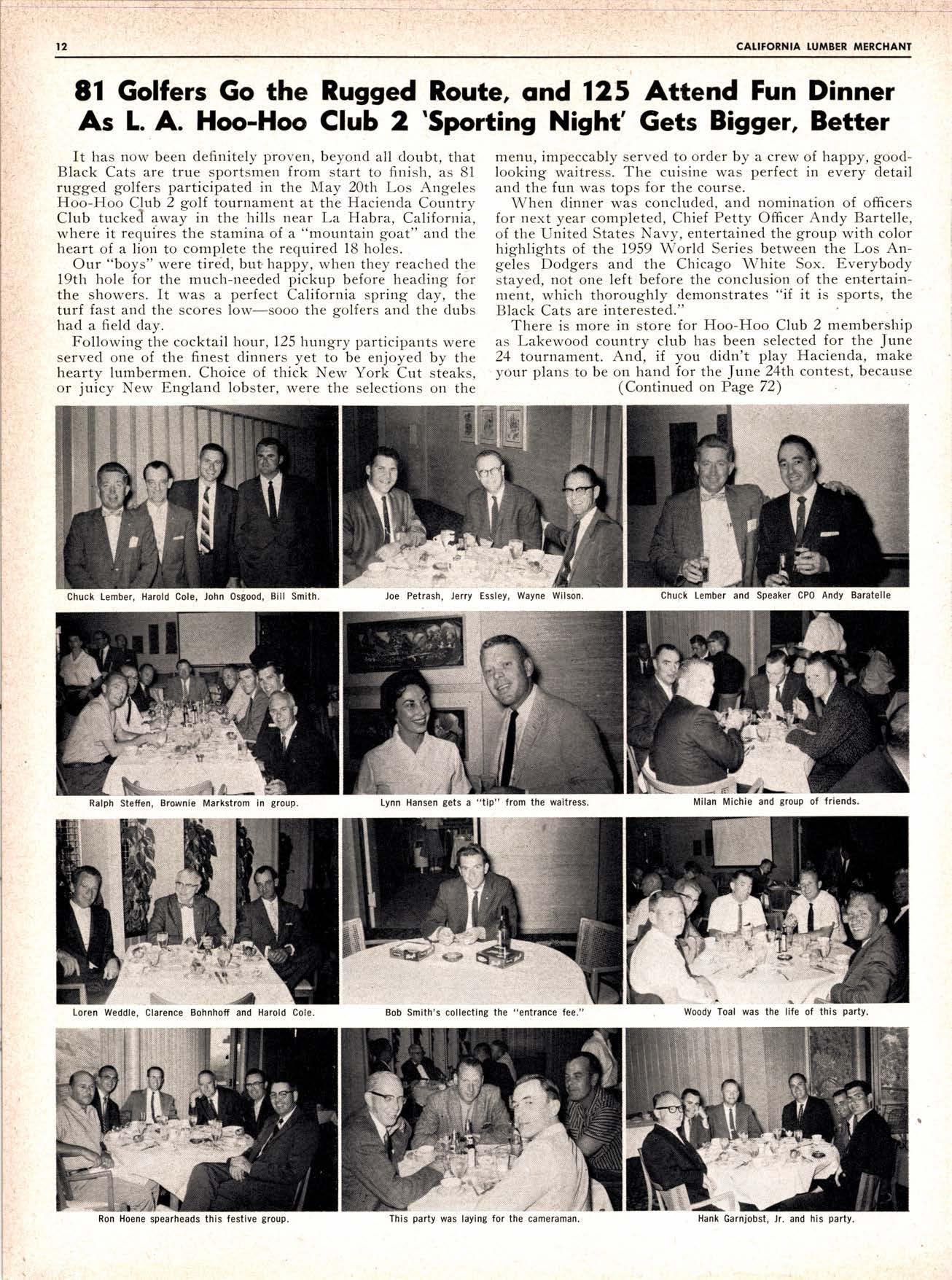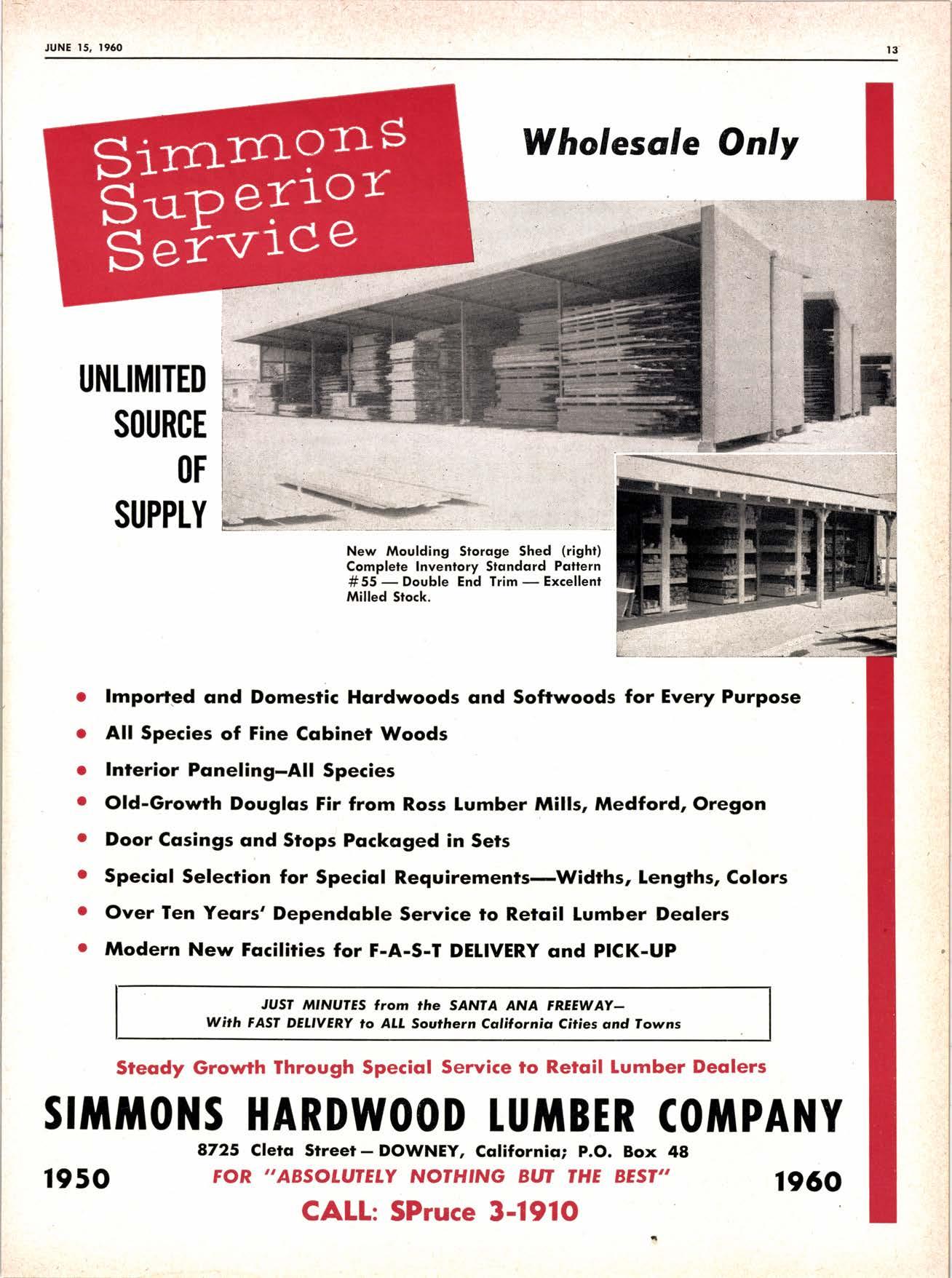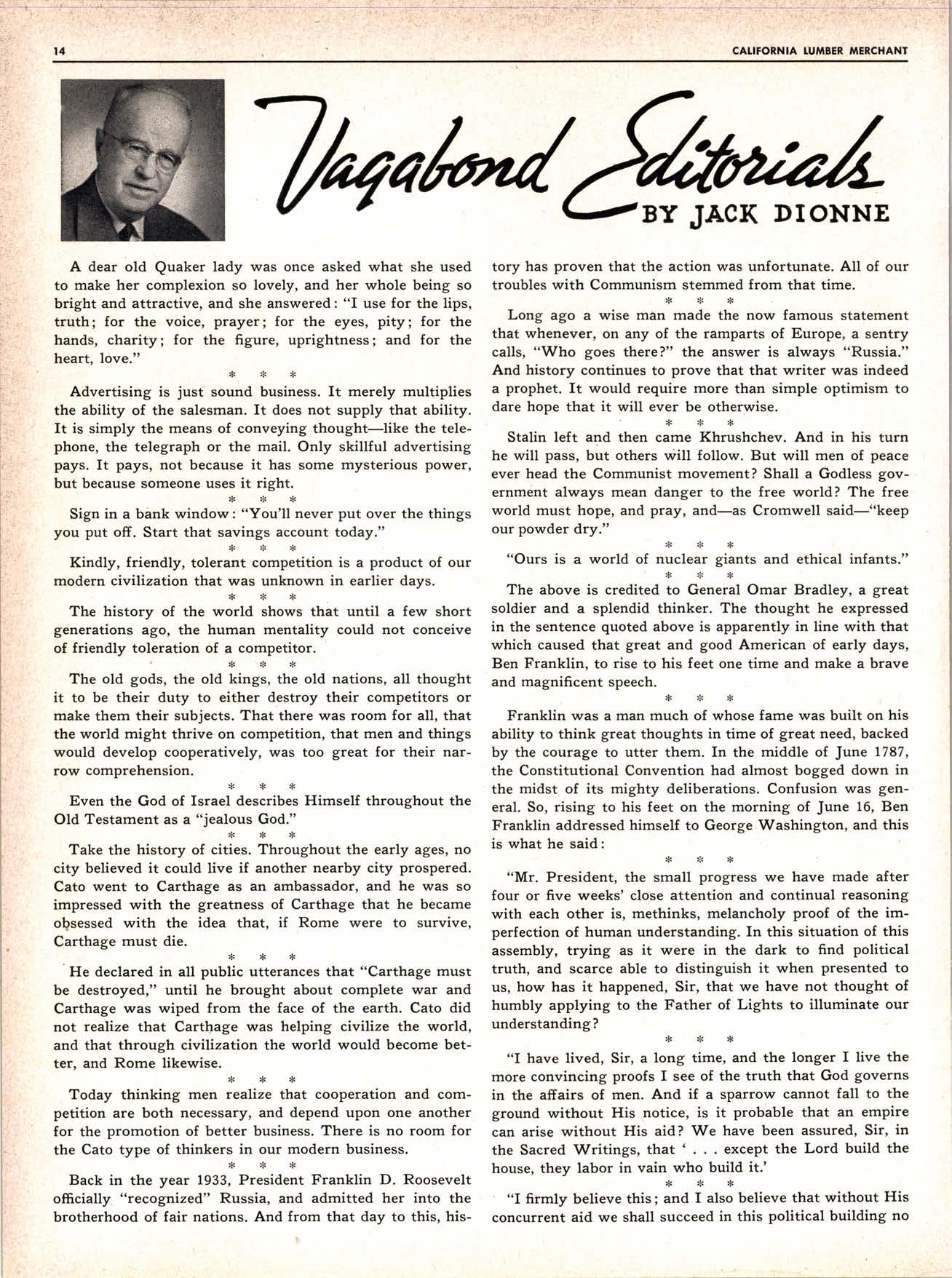
5 minute read
8l Golfers Go the Rugged Route, ond 125 Attend Fun Dinner As L. A. Hoo-Hoo Club 2'Sporting Night' Gets Bigger, Better
I t lr:rs rrt.,n bccn clcllrritcl-r- l)r()\'('r. ltcvonrl :rll <lorrbt, tlriLt lll:icl< Cats irr('trt1e sl)(,r'tsnren it-,,r11 -1"11 to llrrislr.:rs 8l rrrggerl gt.rlfcrs lrarticilr:rtc<1 in tlrc \[ar-2()t]r I-os -\rrgt,1cs
IIoo lJoo ('lulr 2 gt-,1f torrrrralrent .rt the II:Lcicrrrla Courrtlv u,lrere it rcrlrrires tlrt'stanrina oi rL "rr.rorrnt:Lin goat" rLrrrl tlre lrt':irt of lL liorr to corrrplete thc rcrluire rl l8 ho1es.
(llrrb ttrckcrl :rn'iLrl in tlrc hills rrr':Lr I-:r I llrl,r'u, Culii,,rrriri.
( )ur "bo,r's" u'cre tirc<1, but huPIt', u'ht'n tlrrr- rc:rclre tl tlrc l()t1r holc for the nruch-rtec<lctl Pickup bt'fore lre:rrlirrg for tlre shou c't's. It u'as :r perfcct Califot-nirr spring <l:r,r'. tl're lrrrf fast:rrrrl thc sc()rcs 1ou'-sooo thc golfcrs iLrrrl tlrt'rlrrirs lrir<1 a licl<1 rl:r'n-.
Follon'irrg thc cocl<t:Lil horrr, 125 hrrngr',r' 1,:rrtici1,;urt\ \\ e rr. scrr-e11 ottc of thc'llrrest <littrttrs,r'ct to bt enjovcrl lt,r'the heartv lutnbernrett. Chciice of tlrick Ncn'\'orl< Crrt ste;iks. ,rr jttit'_r Nru l:rrgllrtt<1 loltsttr. n-ert't1rc selectiorrs orr thc nl('1lll. inrpeccabl_r'serve<1 to orcler b-r'a crclr,of luLppr-. goo<l Iool<ine- rr'aitrcss.'l-hc crrisine n-:rs pt'rfect irr r','erv det:ril arr<l tlrc frrn n':rs tops for tlre cortrst'.
\\'lrcrr clirrrrrr u':rs cottclrttlecl. :rrrrl rtorttin:ttiort of ofHcers ior rrcxt lelrr conrpletr'<1. Clricf Pcttv C)fhcer.\rr<lr- lJiirtrllc. oI tlrc L. rrite rl States \ ur'-r'. entertlLirrc<1 tl're group lvitlr color hiehlights of the 1c)511 \\'orld Se rit's betu'eett the Los .'\ngclcs I)orlgcrs anrl tlre Chicago \\-hite Sor. I'lvervlto<lv s1:r-r'erl. n()t ()ne left bciorc tlte cottclttsiott of the entcrtainnrt'rrt. u'lriclr thoroug'lrl,r'<leurottstrates "if it is sports. the l'il:Lck Crrts are intcrcstrrl."
'['here is rnore itt store for Iloo-Hoo Cltrb 2 urenrl>crship :rs I -:r1<crvoo<l corrrttrv club 1r:ts beetr selt'cte c1 ior tlie .f une 2J tcmrrr:rrrrcrrt. r\rr11, if vt,u ,lirlrr't 1,llt-r' llaciert<1:t. nrake ,r'our plarrs to be ott lxLrr<1 for the.f trrre 2-lth contest, bccattse qContinrrrrl on Itage 72) o lmpoil.ed qnd Domestic Hordwoods qnd Softwoods for Every Purpose o All Species of Fine Cobinet Woods o Interior Poneling-All Species
. Old-Growrh Douglos Fir from Ross lumber Mills, Medford, Oregon o Door Gosings cnd Stops Pockoged in Sets o Speciol Selection for Speciol Requiremenfs-Widrhs, Lengths, Colors o Over fen Yeqrs' Dependoble Service to Retqil Lumber Deolers o Modern New Fqcilities for F-A-S-T DELIVERY ond PICK-UP

Sreody
A dear old Quaker lady was once asked what she used to make her complexion so lovely, and her whole being so bright and attractive, and she answered: "I use for the lips, truth; for the voice, prayer; for the eyes, pity; for the hands, charity; for the figure, uprightness; and for the heart, love." **
Advertising is just sound business. It merely multiplies the ability of the salesman. It does not supply that ability. It is simply the means of conveying thought-like the telephone, the telegraph or the mail. Only skillful advertising pays. It pays, not because it has some mysterious power, but because someone uses it
Sign in a bank window: "You'll never put over the things you put off. Start that saving-s account today."
Kindly, friendly, tolerant competition is a product of our modern civilization that was unknown in earlier days.
1.**
The history of the world shows that until a few short generations ago, the human mentality could not conceive of friendly toleration of a competitor.
The old gods, the old kings, the old nations, all thought it to be their duty to either destroy their competitors or make them their subjects. That there was room for all, that the world might thrive on competition, that men and things would develop cooperatively, was too great for their narrow comprehension.
Even the God of Israel describes Himself throughout the Old Testament as a "jealous God."
Take the history of cities. Throughout the early ages, no city believed it could live if another nearby city prospered. Cato went to Carthage as an ambassador, and he was so impressed with the greatness of Carthage that he became o[sessed with the idea that, if Rome were to survive, Carthage must die.
'He declared in all public utterances that "Carthage must be destroyed," until he brought about complete war and Carthage was wiped from the face of the earth. Cato did not realize that Cartlrage was helping civilize the world, and that through civilization the world would become better, and Rome likewise.
Today thinking men realize that cooperation and competition are both necessary, and depend upon one another for the promotion of better business. There is no room for the Cato type of thinkers in our modern business.
Back in the year 1933, President Franklin D. Roosevelt officially "recognized" Russia, and admitted her into the brotherhood of fair nations. And from that day to this, his-
BY JACK DIONNE
tory has proven that the action was unfortunate. All of our troubles with Communism stemmed from that time. {<{.*
Long ago a wise man made the now famous statement that whenever, on any of the ramparts of Europe, a sentry calls, "Who goes there?" the answer is always "Russia." And history continues to prove that that writer was indeed a prophet. It would require more than simple optimism to dare hope that it will ever be otherwise. {< l. {.
Stalin left and then came Khrushchev. And in his turn he will pass, but others will follow. But will men of peace ever head the Communist movement? Shall a Godless government always mean danger to the free world? The free world must hope, and pray, and-as Cromwell said-"keep our powder dry.t'
"Ours is a world of nuclear giants and ethical infants."
The above is credited to General Omar Bradley, a great soldier and a splendid thinker. The thought he expressed in the sentence quoted above is apparently in line with that which caused that great and good American of early days, Ben Franklin, to rise to his feet one time and make a brave and magnificent speech. * * {.
Franklin was a man much of whose fame was built on his ability to think great thoughts in time of great need, backed by the courage to utter them. In the middle of June 1787, the Constitutional Convention had almost bogged down in the midst of its mighty deliberations. Confusion was general. So, rising to his feet on the morning of June 16, Ben Franklin addressed himself to George Washington, and this is what he said:
"Mr. President, the small progress we have made after four or five weeks' close attention and continual reasoning with each other is, methinks, melancholy proof of the imperfection of human understanding. In this situation of this assembly, trying as it were in the dark to find political truth, and scarce able to distinguish it when presented to us, how has it happened, Sir, that we have not thought of humbly applying to the Father of Lights to illuminate our understanding? {. * {.

"I have lived, Sir, a long time, and the longer I live the more convincing proofs f see of the truth that God governs in the affairs of men. And if a sparrow cannot fall to the ground without His notice, is it probable that an empire can arise without His aid? We have been assured, Sir, in the Sacred Writings, that ' . . except the Lord build the house, they labor in vain who build it.' **{<
'
"I firmly believe this; and I also believe that without His concurrent aid we shall succeed in this political building no










